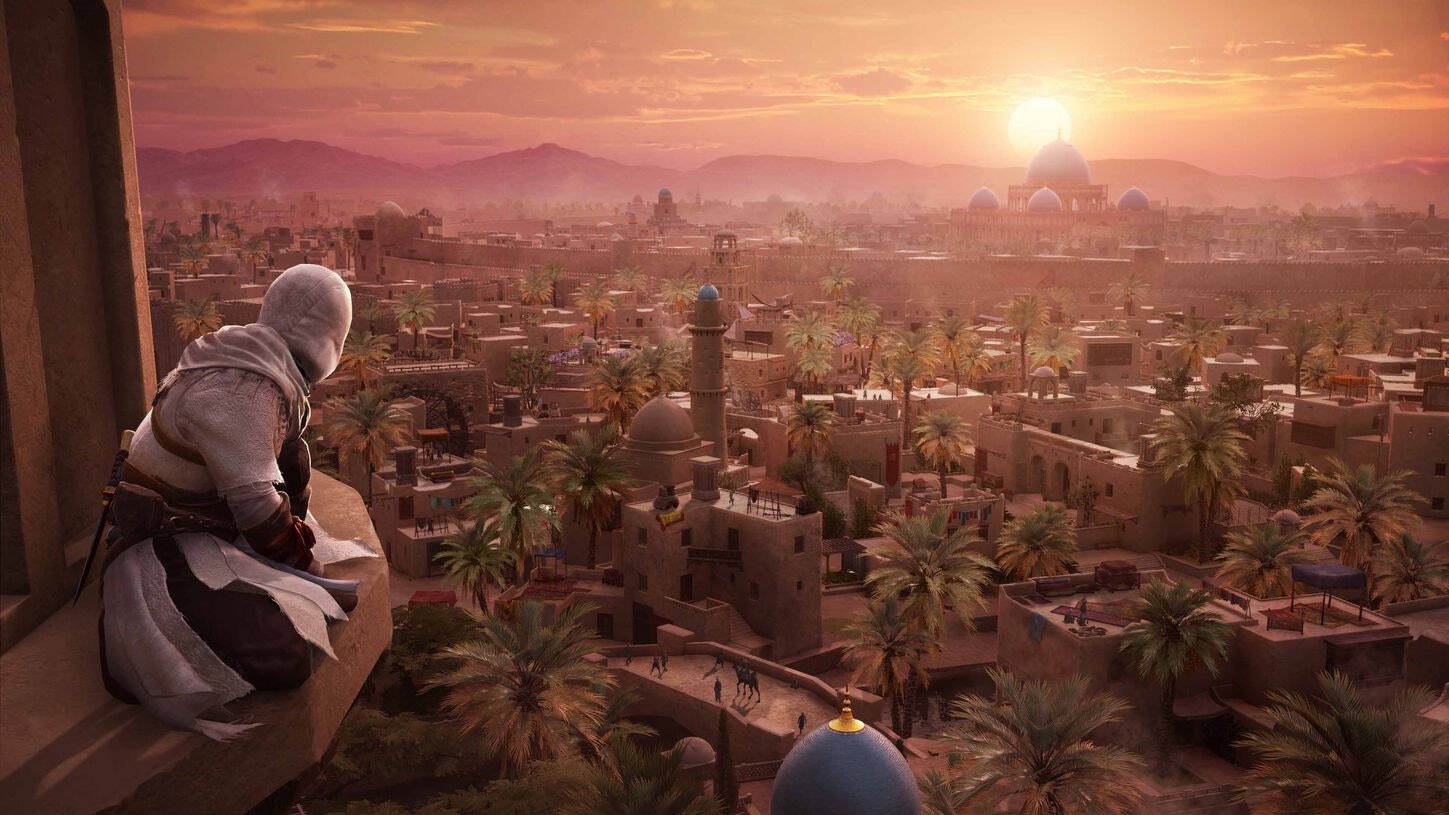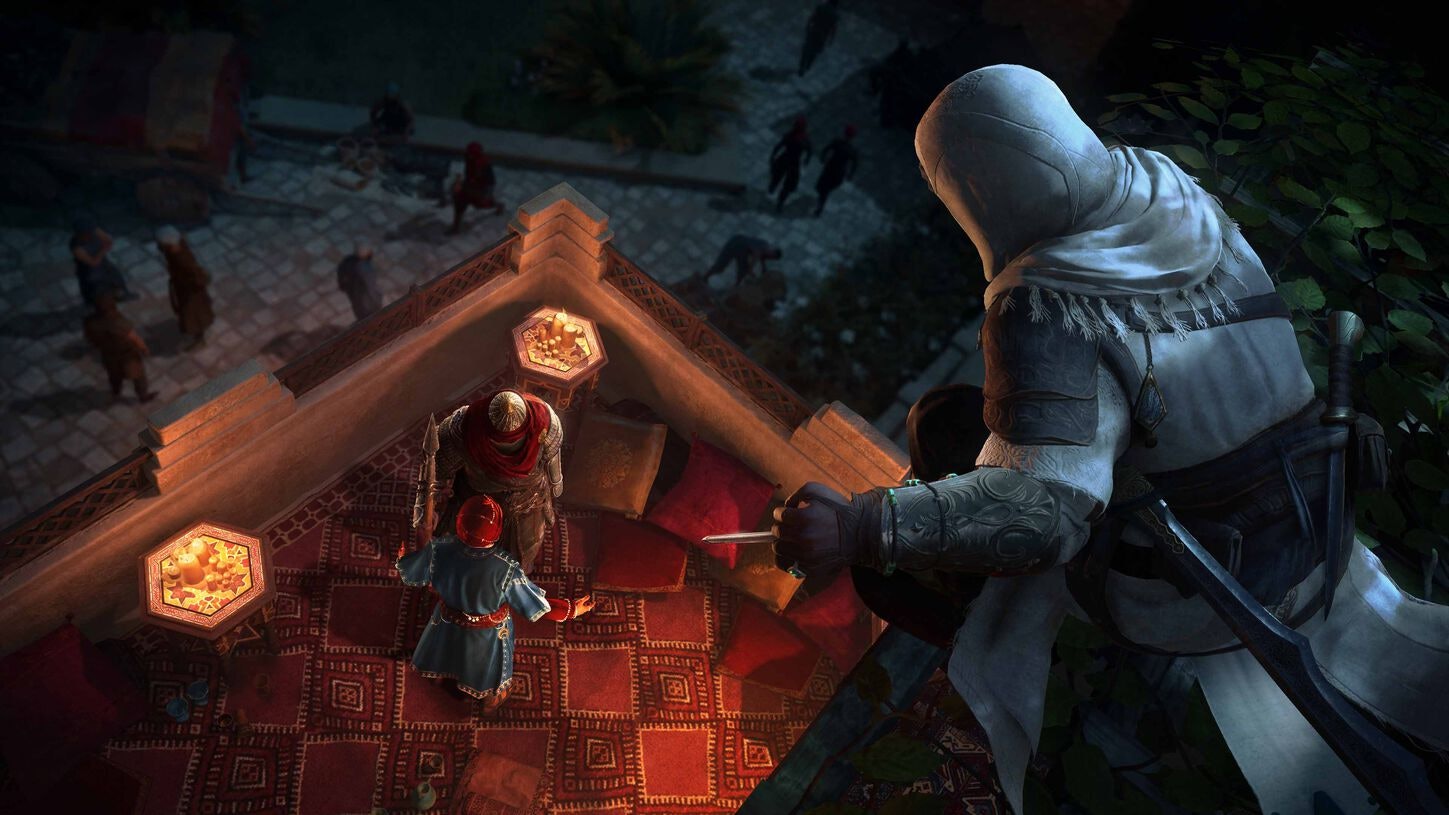
Within seconds, my hands recognize that I am playing an Assassin’s Creed game even before my eyes do. The familiar feeling of holding down a button and pushing my protagonist forward to parkour across rooftops instantly activates my muscle memory and I just act. It transports me to the early entries in the franchise, devoid of any RPG bloat. Which is exactly what Assassin’s Creed Mirage’s developers at Ubisoft Bordeaux are going for.
The newest entry in the franchise, set to be released October 5, is a back-to-basics moment for Assassin’s Creed. After spending almost four hours with Assassin’s Creed Mirage it is safe to say Ubisoft is on track to accomplishing that goal. This is mostly for the better, but not without several flaws that are also a holdover from the original formula.
As the thirteenth entry in the franchise, Mirage seeks to put the open-world RPG direction Assassin’s Creed has stuck to since 2017’s Origins in the past and instead resurrect the stealth and parkour-focused gameplay of the first nine titles (the last being 2015’s Syndicate). The most recent game, 2021’s Valhalla seemed to be a tipping point where fans perceived the franchise as reaching an unsustainable level of bloated world design and empty quests. Hence Mirage’s return to form.
The biggest change players will initially notice in Assassin’s Creed Mirage is a reduction in scale. Mirage’s world is not the sprawling mountains and cities of Valhalla, and that is a very good thing. Instead, Mirage focuses the story of protagonist Basim and the playground he gets to run free in, to the boundaries of a singular city — 9th-century Baghdad. Even in my limited time with the game, I could easily traverse large swaths of Baghdad's cityscape. Finding a synchronization point high above the other buildings allowed me a 360-degree view in which I could always see the city limits.
If it sounds confining in comparison to the open world of Valhalla, then put those fears aside. Mirage’s beautiful recreation of Baghdad is a bustling sandbox with something to entice players around every corner. During a brief run towards a mission objective, I stumbled into a side quest that had me attempting to help a boy jump down from a tower, leading to some surprising connections to the franchise’s history. It’s a brief moment, but one that leaves the impression the world of Baghdad has so much more to discover than any open-world map of Assassin’s Creed past.
The choice of Baghdad also served as a major boon to the developers due to one key architectural aspect of the city, its rooftops. As Artistic Director Jean-Luc Sala informs me, 9th-Century Baghdad was a packed city whose buildings were defined by their flat rooftops, making it an Assassin’s dream.
That checks out in practice, as no more than a few seconds pass during my play session when I am not bounding across rooftops. It’s a refreshing juxtaposition to the predominantly flat landscape of Origins, Odyssey, and Valhalla whose main mode of traversal was on the back of an animal due to the sheer size of the map. Running across Baghdad's rooftops puts me into a familiar flow state from the earliest Assassin’s Creed games, parkouring forward and never stopping as the game seems to always have some wall or rooftop to latch onto next.

It all combines to form a nostalgic feeling in the player, making them remember what was once so great about Assassin’s Creed. But Mirage is not all rose-colored glasses, it has its flaws too.
Assassin’s Creed has been in its open-world phase for eight years, and while players have gotten tired of the repetitive formula it's important to remember why the franchise pivoted in the first place. 2015’s Syndicate, while respectable, was itself a repetitive game that felt nearly the same as the eight entries that came before it. Fans were fatigued and the franchise needed to change. Mirage throws players right back into that same style of game design, with the hopes that eight years is enough to make players forgive and forget.
With the limited time I had with Mirage, flaws were already popping up in the world. They weren’t that surprising, as they had existed in the early entries in the franchise that Mirage is trying to emulate. Most glaring is the game’s combat.
The Order of Assassins is one focused on stealth, and stealth still feels great in Mirage, but the moments where you are confronted with a face-to-face fight feel messy. The game’s system of dodging and parrying isn’t as developed as a full-fledged action game and it often feels like the best option is to just button mash and force your way through it. Which is a true old-school Assassin’s Creed experience. If, like me, players always prioritize stealth then it won’t be that much of a problem, but there were moments when it felt inescapable.
Coming away from my preview, I left optimistic that Assassin’s Creed Mirage will be able to transport franchise fans back to the perceived glory days of the early entries. While there are flaws, there is also so much that feels good about the world of Mirage and its rendition of Baghdad as an Assassin’s playground. Hopefully, the years since Ubisoft last attempted this style have given developers the space to sand off the rough edges.






